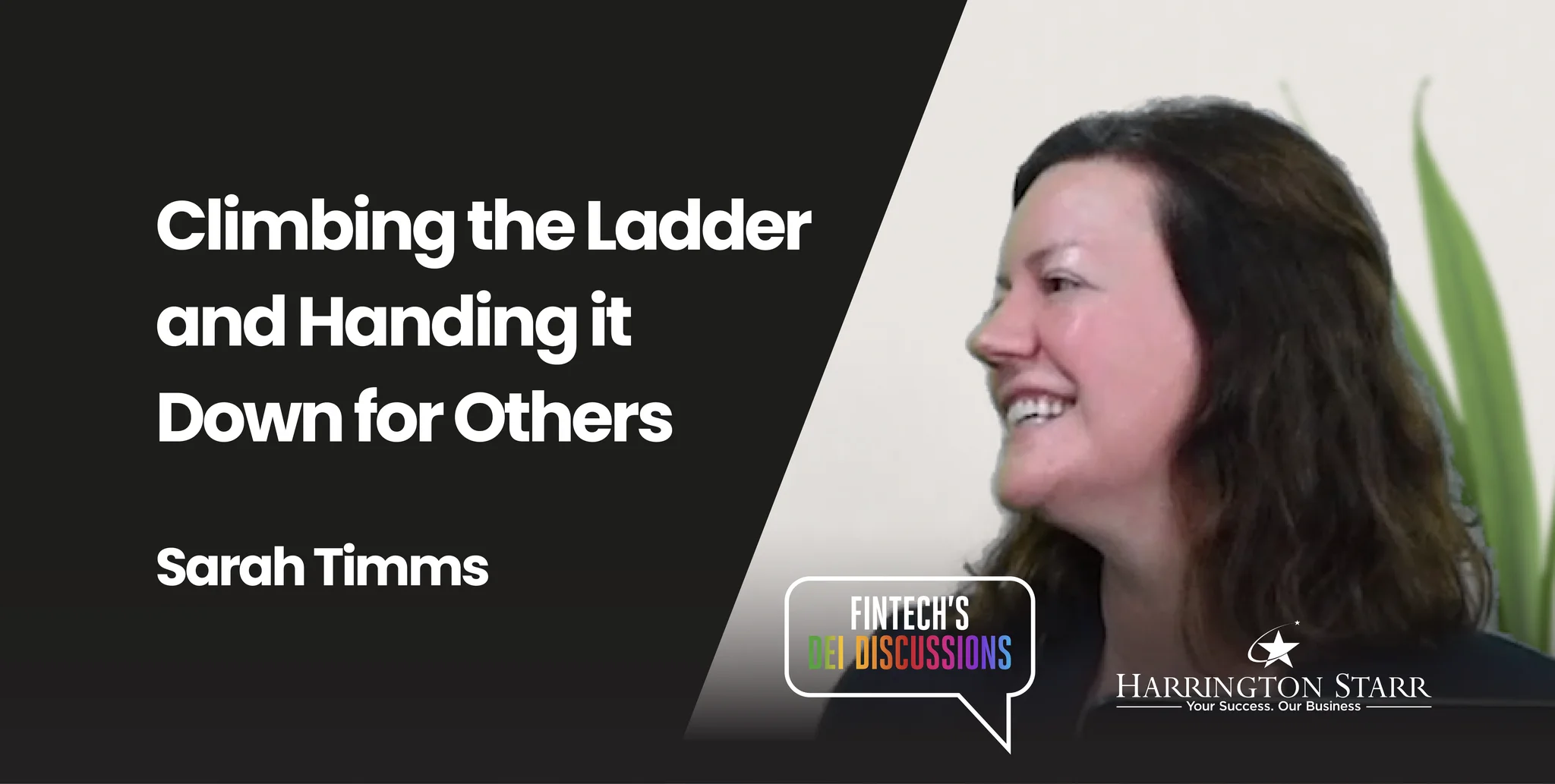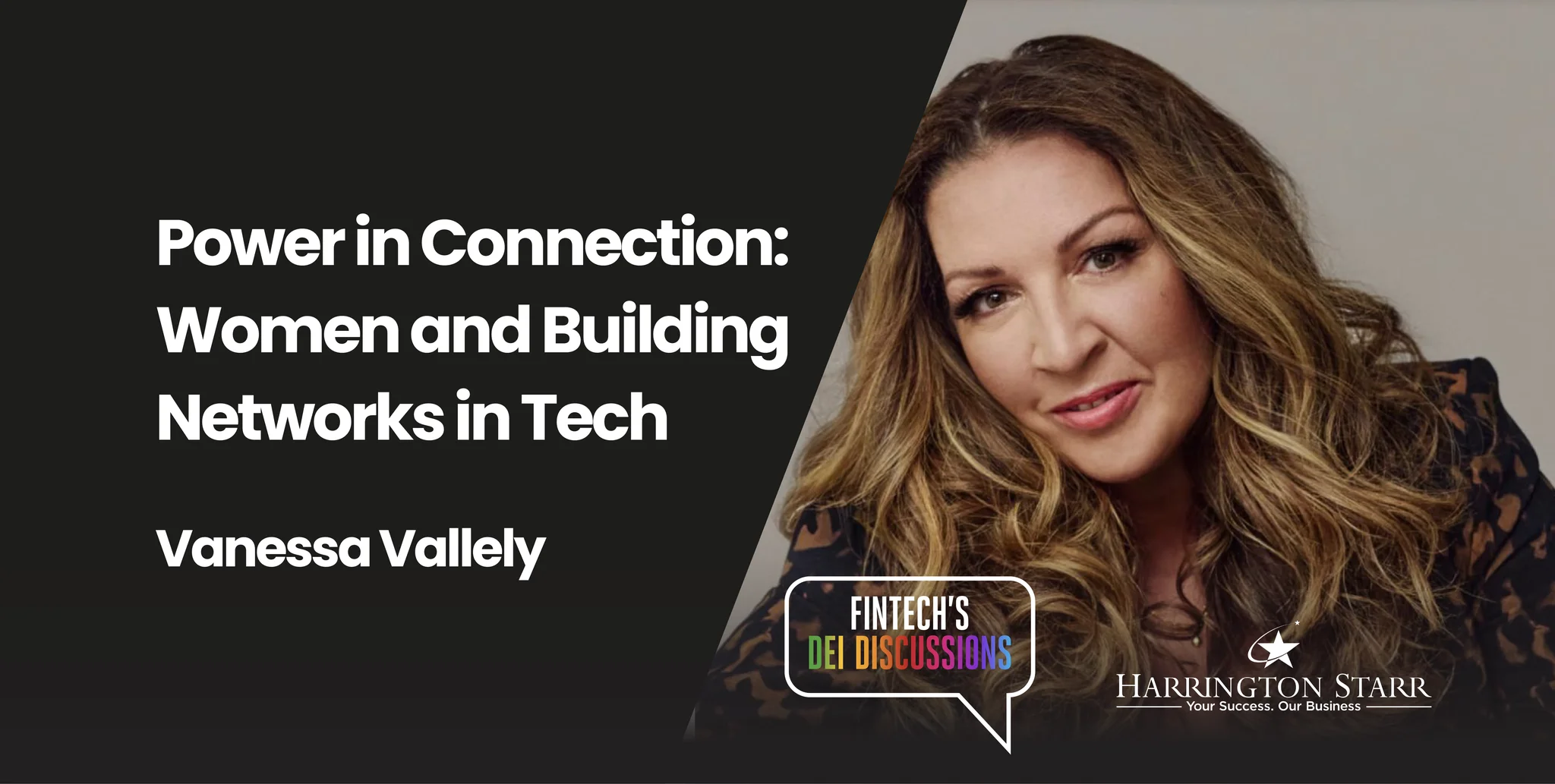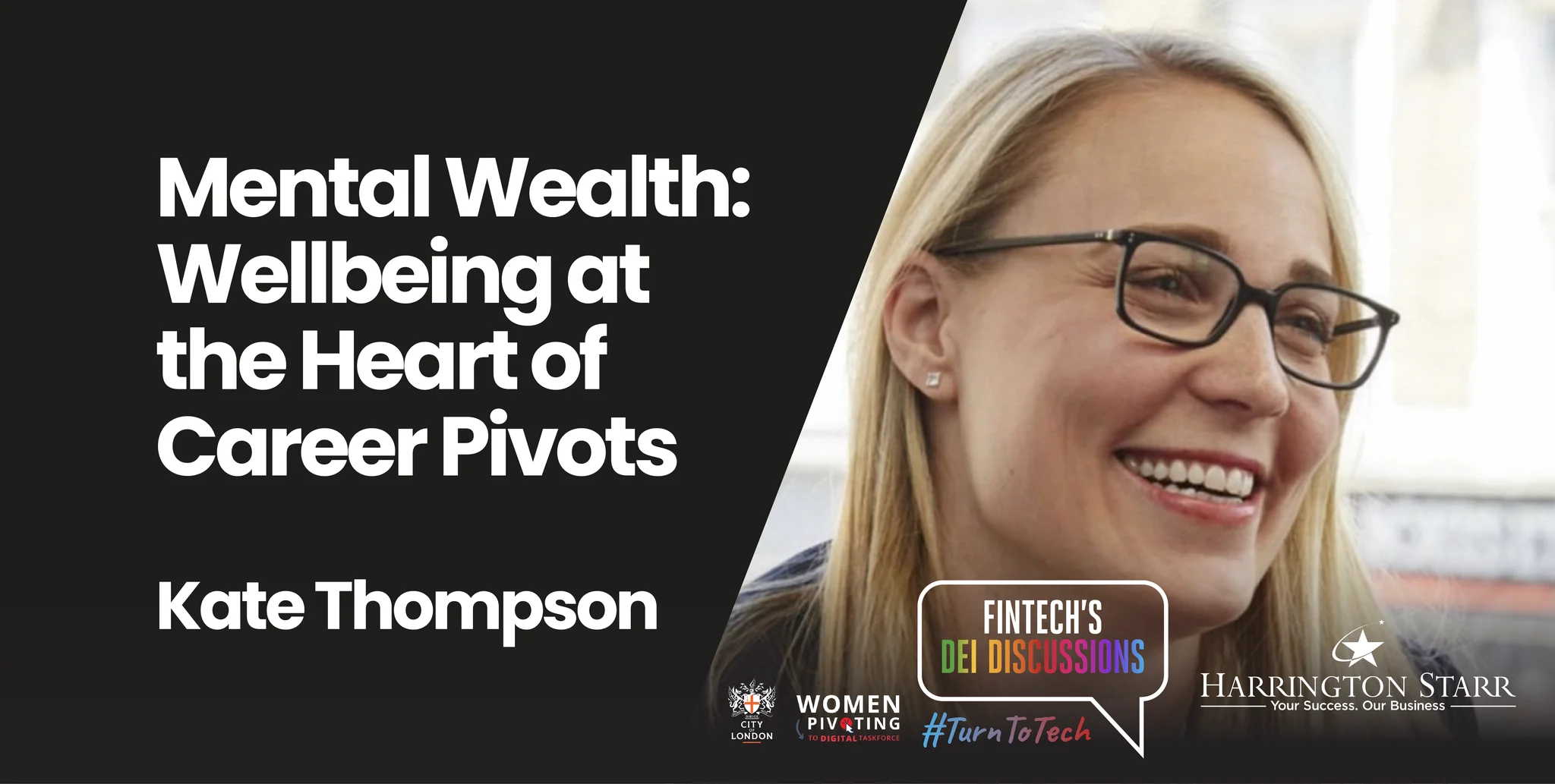
The Power of Being Yourself in a World That Told You to Fit In
In this episode of FinTech’s DEI Discussions, Nadia sits down with Sarah Timms, Co-Founder and Chief Product Officer at InTick, to explore a story that epitomises what it means to lead with authenticity in the world of financial technology.
The conversation moves through Sarah’s unexpected journey from law into FinTech, her experience of founding two technology businesses, and her perspective on inclusion, leadership, and innovation. Her story represents much more than a successful career; it’s a reflection of how modern FinTech is shaped by individuals who dare to ask if there is a better way to do things.
For anyone working in FinTech or building teams in the sector, Sarah’s journey demonstrates that innovation and inclusion are not competing priorities but powerful forces that thrive together.
From Solicitor to FinTech Founder: A Career Built on Curiosity
Sarah’s professional story began far from technology. She started her career as a solicitor but soon realised that the legal profession wasn’t the right fit for her. The environment felt rigid, and the culture didn’t align with her natural strengths or values. She describes how, even early on, she sensed that she would not be the kind of lawyer who found fulfilment in the profession’s competitive structures.
Leaving law was a bold move. It took her to the United States, where her husband is from, and opened the door to a completely different kind of work. There, she began a new chapter in the non-profit sector, working in areas that reflected her deep personal interests, animal welfare and environmental conservation.
During this time, she discovered an industry insight that would change the direction of her career. Only a tiny percentage of global charitable giving went to environmental and animal welfare causes, despite their importance. It made her think about how money flowed into these areas and whether technology could bridge the gap. Around the same period, the idea of crowdfunding was emerging. This new form of digital giving fascinated her because it represented a way to bypass traditional systems and empower individuals to contribute directly to the causes they cared about.
Recognising that no one else was building technology specifically for this purpose, Sarah decided to do it herself. In 2011, she founded one of the first crowdfunding platforms of its kind, an organisation that used technology to connect donors with environmental and animal welfare projects. She ran the company for six years, an experience that not only introduced her to the world of technology but also taught her the fundamentals of leading a startup, growing a team, and building something from the ground up.
When she eventually exited the business and returned to the UK, she carried with her both technical knowledge and a clear sense of purpose. What started as an accidental encounter with technology had become the foundation for her future career in FinTech.
Creating InTick and Bridging Two Worlds in FinTech
Back in the UK, Sarah continued to develop her career in technology. She worked within large organisations, gaining experience in how to manage complex technical environments and how to scale teams efficiently. These roles taught her about structure, governance, and the discipline required to deliver technology at scale.
While consulting, she met James Goater, who shared an idea for a new kind of FinTech company. Together, along with another co-founder, they built what would become InTick, a listed derivatives trading network designed to simplify one of the most traditional and manually operated areas of the financial markets.
Sarah describes InTick as the “Rightmove for listed derivatives”, a digital platform that allows buyers and sellers to connect quickly and easily. The world of listed derivatives, she explains, had long resisted the wave of electronification that transformed other parts of finance. Processes remained slow and inefficient, leaving significant opportunity for innovation.
InTick’s mission was to change that, to create a network that could make these transactions as seamless as buying or selling a home online. It was an ambitious goal, but one that combined both deep technical understanding and specialist financial knowledge.
What makes the company culture particularly unique is the intersection of two very different environments. On one side, there is deep technology, driven by creativity and problem-solving. On the other hand, there is financial services, shaped by experience, discipline, and industry expertise. Bringing those together, Sarah says, has created an extraordinary energy. It’s this collision of innovation and tradition that fuels InTick’s growth and defines its culture, a culture where curiosity and inclusion are just as important as coding and compliance.
Redefining Inclusion in Financial Technology
When Nadia asks what inclusion means to her, Sarah reflects deeply on her early experiences. She recalls training in law under a female leader who projected what she saw as “hyper-masculine” traits, aggression, assertiveness, and competitiveness. As a young professional, she found it difficult to relate to that style of leadership.
Years later, she looks back and wonders whether that behaviour was truly authentic or simply a reflection of what that woman felt she had to do to succeed in a male-dominated profession. The thought has stayed with her ever since. For Sarah, true inclusion means creating workplaces where no one has to pretend to be someone else to progress. It’s about being able to speak softly if that’s your nature, to think before responding, and still be respected and heard.
Working in both technology and financial services, two historically male-dominated industries, has shown her how far there is still to go. Even today, she notes, it’s unusual for her to be in a leadership meeting where other women are present. She reflects on how, throughout her entire career, she has never actually had a female boss. It’s something she finds disheartening, not because her male leaders haven’t been supportive, but because the lack of female role models in senior FinTech positions remains an issue.
Inclusion, she believes, is not only about gender balance but about diversity of thought. In the best teams she has worked with, people approach problems from completely different angles. Someone will often suggest an idea that seems unexpected at first but turns out to be the perfect solution. For her, the power of innovation comes from bringing together individuals who think differently and allowing those differences to be valued.
Diversity of Thought as the Foundation for FinTech Innovation
Sarah’s philosophy around product development and technology leadership is built entirely around this principle of inclusion. As someone who oversees both product and technology at InTick, she believes that the key to building world-class FinTech products lies in constant curiosity and collaboration.
Her approach begins with listening to customers, understanding their challenges at a deep level and identifying where the real pain points lie. For her, the customer doesn’t need to design the solution; that’s the job of the product team. The role of a FinTech innovator is to take those challenges, gather diverse perspectives, and design elegant, efficient answers through technology.
This, she explains, is how InTick continues to evolve. Every new feature, every technical enhancement, comes from a process of shared thinking and collective creativity. Rather than chasing big, headline-grabbing innovation, Sarah focuses on consistent progress. She once read that if a company delivers a million tiny innovations, it becomes “untouchable.” That philosophy now drives her work at InTick, continuous, thoughtful improvements that make the user experience better each day.
Her background in technology, rather than financial services, gives her a valuable outsider’s view. She often looks at long-standing industry practices and questions their logic. Processes that have been accepted for years can suddenly seem inefficient when viewed through a different lens. By asking simple questions like “Is there a better way?”, Sarah and her team find new approaches that not only enhance their product but also modernise an entire corner of the industry.
The Power of Purpose in FinTech Fundraising
Another key topic in the conversation is funding, a challenge that many FinTech founders face, especially in uncertain economic times. Yet Sarah’s experience with InTick has been encouraging. To date, the company has raised around £2 million from private angel investors. The current funding round, which includes institutional investors, is also progressing positively.
She attributes that success to clarity of purpose. InTick’s mission addresses a genuine gap in the market, and potential investors understand the value of solving that problem. When an industry recognises that a product meets a clear need, it becomes much easier to secure backing.
For Sarah, this highlights a crucial point for founders and leaders across FinTech: innovation must be grounded in real demand. Technology for its own sake isn’t enough. The most investable ideas are those that clearly improve how people work, trade, or interact with financial systems.
Building Inclusion One Small Step at a Time
Towards the end of the episode, Nadia asks Sarah for practical advice on how people can promote inclusion within their own organisations. Sarah’s answer is both realistic and inspiring. She believes that inclusion is achieved not through grand gestures but through small, consistent actions.
Her first recommendation is to connect people to supportive networks. Early in her journey at InTick, her co-founder introduced her to a group for women working in financial services. That network became an invaluable space to share experiences, learn from others, and find encouragement in a male-dominated sector. She encourages other leaders to do the same, to ensure that women in their organisations have access to professional communities where they can grow.
The second step, she explains, is to intentionally bring different voices into problem-solving conversations. When planning a new product feature or discussing strategy, she often invites people from departments who wouldn’t normally be involved, marketing, sales, or other teams. Including these perspectives frequently leads to more creative and effective outcomes. It’s a simple but powerful practice that every organisation can adopt.
Her final piece of advice focuses on mentorship and opportunity. Within a group she participates in, called Women in Financial Markets, Sarah once heard a question that resonated deeply with her: when women climb the career ladder, do they pull it up behind them, or do they leave it down for others? She uses that question as a reflection point, encouraging women in leadership to think about how they can lift others as they progress.
Throughout her career, Sarah has made mentorship a priority. She regularly reviews CVs, helps people prepare for interviews, and supports women with salary negotiations, a process that many find daunting. She also looks for individuals in her own workplace who may not be flourishing in their current roles and finds ways to help them transition into technology positions. With the right training and encouragement, she believes, anyone can excel.
This belief underscores one of Sarah’s most important messages: that potential is everywhere, and leadership means creating the conditions for others to succeed.
Authentic Leadership and the Future of FinTech
What makes this conversation between Nadia and Sarah so powerful is its honesty. It’s not simply a story of professional achievement but of personal growth, reflection, and purpose. Sarah’s journey from law to FinTech, from non-profit work to deep technology, demonstrates that success often comes from embracing difference, not hiding from it.
Her insights also speak to the wider FinTech landscape. As FinTech recruitment specialists, Harrington Starr sees the same pattern across the industry: the businesses that thrive are those that champion diversity of thought, invest in inclusive cultures, and empower individuals to bring their full selves to work. Innovation in financial technology doesn’t just depend on algorithms or platforms; it depends on people who feel valued, supported, and free to think differently.
Sarah’s leadership at InTick captures this balance perfectly. The company’s success comes from merging two worlds, financial expertise and technological creativity, and building an environment where all ideas are welcome. It’s a model that FinTech firms across the UK, Europe, and beyond can learn from.
In a sector often associated with disruption, Sarah reminds us that the most transformative change comes not from technology alone but from the people behind it. Inclusion, curiosity, and compassion are not just values, they are strategies for success.





